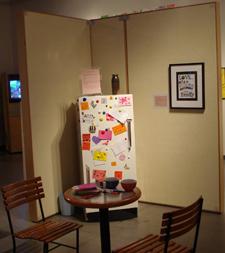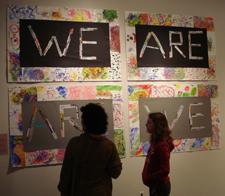
INTERACTIVE. Visitors are encouraged to write a message on a sticky note and post it on the exhibit's fridge in the mock kitchen. Credit: Ralph Higgins photo
An historic Halifax site is the setting for a very modern exhibit called We Are: Expressions of Family — a Queer Experience. As an immigration museum, Pier 21 may seem like an odd choice for an exhibit that explores and celebrates queer families, but it has long been a place of welcome, explains Kim Reinhardt, the museum’s chief curator.
Between 1928 and 1971, Pier 21 was an immigration facility where over one million people got their first glimpse of Canada. One in five Canadians has a connection with Pier 21, and it was even recognized as one of Canada’s “seven wonders” by a CBC survey.
Pier 21’s community mandate is to encourage “cultural groups to create their own exhibitions and tell their own stories, while celebrating themes related to immigration, cultural diversity, cultural heritage and identity.” So it seemed like a perfect fit when curator Terrah Keener was looking for a space to showcase the creations of the workshops she had been facilitating. Many of her friends were skeptical about the reaction she would have from Pier 21, but Keener says “the whole experience has been fabulous and everyone there has been extremely supportive.”
The idea for the exhibit began when Keener was doing research for her doctoral dissertation on the experiences in school of children of queer parents. A queer parent herself, Keener was intrigued to explore the questions that arose during conversations between children and parents about how they present themselves to the largely heterosexual world, and how they define family for themselves. Last of all was: What is the story you want to tell? In a series of four workshops, parents and children create visual representations of their family life and of themselves. These vibrant creations are on display in the new Rose and Ralph Chiodo Harbourside gallery at Pier 21.
In one corner of the gallery, a monitor plays a video taken during the actual workshops. The artwork created by the queer families is displayed on walls, stands and even refrigerators of a mock kitchen. As might be expected, there are lots of brightly coloured drawings, collages, photos, and cartoons. Many of the works are humourous and happy, but some are moving pieces evoking the difficulty caused when queer families are not recognized. Visitors are encouraged to take part in the exhibit by putting a sticky note on the refrigerator at one of the mock kitchen sets. Most of the messages are very simple: “Love is all that matters,” “I love my Dads.”
As curator Reinhardt states in the introduction to the exhibit catalogue, “Seldom are the stories of lesbian, gay, bisexual, transgendered and queer Canadians and their families given a voice in the narrative of the Canadian mosaic. We Are thoughtfully celebrates an expanded understanding of family life in Canada and the mosaic of Canadian society.”

 Why you can trust Xtra
Why you can trust Xtra


